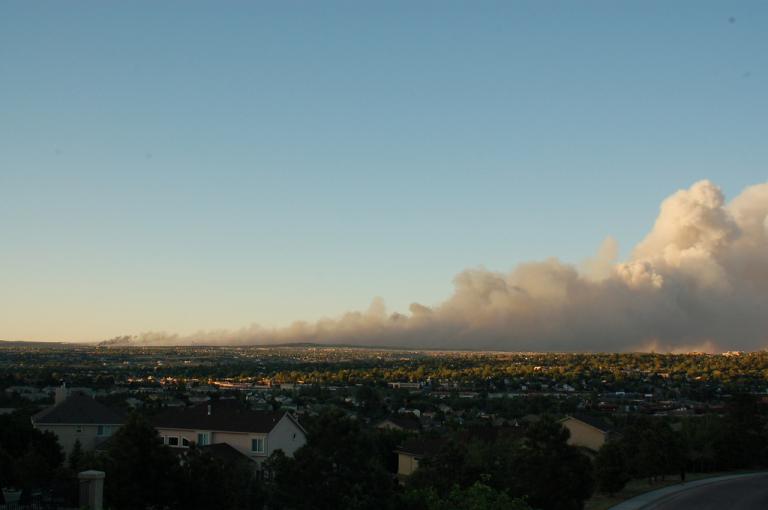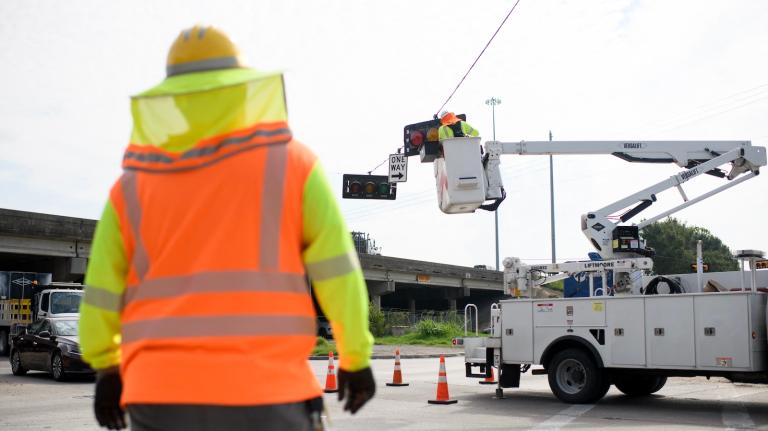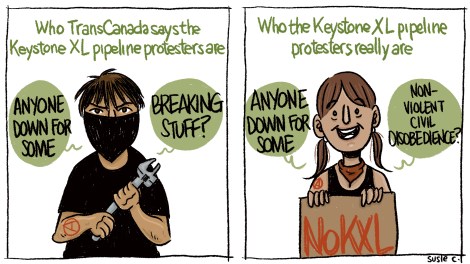
With mounting public opposition against the construction of the Keystone XL pipeline that would carry tons of tar-sands oil right down the middle of the country, pipeline owner TransCanada seems to be getting a little nervous. At least, that’s the feeling you get reading the PowerPoint presentations the company’s staff has been putting together back in the corporate bunker.
TransCanada and law enforcement presentation materials were obtained from Nebraska State Patrol via a Freedom of Information Act request filed by the grassroots opposition group Bold Nebraska. They reveal the corporate logic that’s driving the fight against anti-pipeline activists who have been attempting to physically blockade Keystone XL construction since 2012.
From the activists’ perspective, it’s been a whole lot of police pepper-spray and pain-compliance holds. From TransCanada’s point of view, though, the blockaders are endangering critical infrastructure, and should be prosecuted to the full extent of the law. Here’s a fun sample slide from a PowerPoint presentation, dated December 2012, apparently compiled by the company for local law enforcement agencies:
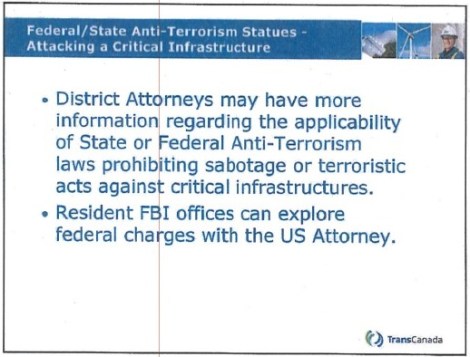
Activist groups working against the pipeline construction say they maintain strict nonviolent guidelines that prohibit property destruction. But they clearly do pose a threat against the pipeline — if they didn’t, TransCanada wouldn’t be buttering up local law enforcement.
TransCanada emphasizes how many “professional, paid” activists are involved in pipeline protests, and lists the names of two dozen protesters and “aggressive/abusive” local property owners who have been arrested for blocking construction. Daryl Hannah gets her own slide, natch. Also implicated: Occupy and “hacker group ‘Anonymous.’”
The company charges activists with such crimes as a “slap on the shoulder” at a county board meeting in Nebraska, “walk(ing) into the lane of a slow moving vehicle” in Oklahoma, and putting up “banners, signs” in Texas. One of the presentations spends 18 pages detailing a cornucopia of potential misdemeanor and felony charges local authorities could levy against activists, including criminal conspiracy in Texas, Oklahoma, and Nebraska. “Check with your local DA”! The documents highlight a Texas law against “criminal instruments,” i.e. protest tools like lockboxes, that’s been used in the past against Greenpeace and Occupy.
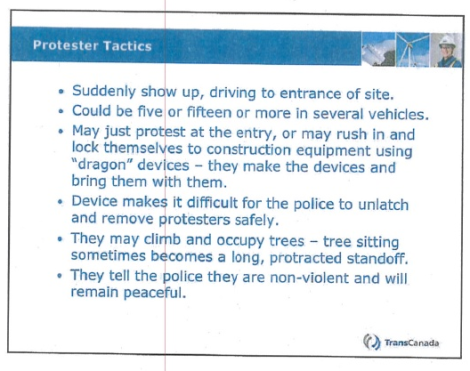
One section attempts to describe the “well funded” activist movement against the pipeline with a bunch of pictures of tree-sits and a hefty amount of scaremongering with inexplicably detailed, 20-year-old how-to’s on property destruction such as monkeywrenching from the Anarchist Library.

In addition to TransCanada’s own eco-terrorism primer, Bold Nebraska also obtained an April 25 presentation from the Nebraska Information Analysis Center, a “law enforcement fusion center” that works with the FBI and Department of Homeland Security to “increase the awareness of potential threats.” It warns against all manner of hypothetical terrorist activity with a bevy of low-res clip art.
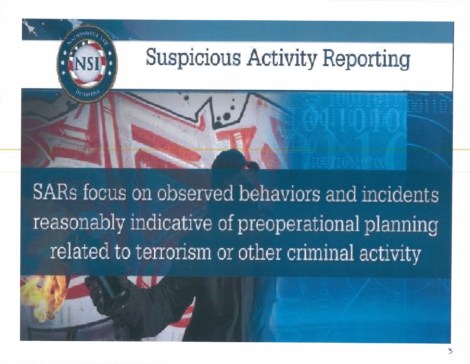
“During construction, we have encountered a number of confrontations and trespasses on the company’s right-of-way (employees/contractors being grabbed, threats of serious physical harm and violence) that have required our company to take additional security precautions,” TransCanada spokesperson Shawn Howard told E&E News.
That’s certainly not how activists, including Tar Sands Blockade spokesperson Ron Seifert, see it. “Although the rhetoric of the ‘corporate state’ gets thrown around frequently, it is quite alarming to see unequivocal evidence that both federal and local law enforcement are taking their cues from a multinational corporation instead of the local families and communities directly impacted by the potential destruction of their homes and the threats to their water and air,” he said.
Seifert, a frequent movement spokesperson (and “cyclist”) and Scott Parkin, senior global finance campaigner with Rainforest Action Network, are among three particularly outspoken members of the movement’s “leadership” who are profiled in more detail in the company documents.
Some of TransCanada’s recent moves — such as allegedly filming property owners walking around on their own land, according to Bold Nebraska — seem strange, if not outright spy-ish. But being surveilled and labeled a terrorist against enterprise has become kind of de rigeur in U.S. eco-activism. It’s just “one of those situations where a corporation is being allowed to frame activists in terms that are really untrue and dishonest: as terrorists,” Parkin told me.
The Houston, Texas, native also had the pleasure of being profiled in an Exxon dossier about 10 years back. But that doesn’t make it any less “appalling,” he says — and, well, scary.
But if these documents aren’t new, what do they actually mean? Does the multinational energy giant actually believe tree-sitting activists are violent terrorists, or is this effort aimed at riling law enforcement into ratcheting up the criminal charges?
Will Potter, author of Green is the New Red, argues that this is all a public relations war. “TransCanada is not pleading with law enforcement to crack down on property destruction or violence, because that’s not what this campaign is about. The campaign against the Keystone XL pipeline has resulted in widespread public support, and positive media coverage about people willing to nonviolently put their bodies on the line.”
Nonetheless, there are real implications for the people out on the ground. “TransCanada has been giving this presentation, or a presentation really similar to this one, since last year” along the pipeline’s proposed route, Parkin said. “They’re going out and creating an atmosphere in a place like Nebraska where it’s going to make it much more dangerous for organizers and activists to do work there … I worry that we have uneducated, poorly trained police out there that are taking all of this to heart.”
How will activists respond?
“There are a lot of people who are in a kind of middle ground on this issue. I think this sort of thing might scare those people and now they might not participate,” Parkin said. But seasoned activists have been through this before. “I definitely don’t think this is going to deter anybody. I actually think it emboldens us a bit.”
Uh, thanks, TransCanada?

